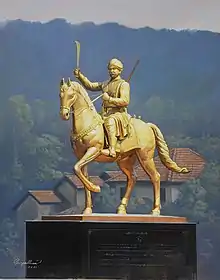Guddemane Appaiah Gowda
Guddemane Appaiah Gowda was an Indian freedom fighter and revolutionary, he instated a peasant army from Kodagu and became its commander in-chief to lead the Amara Sullia Rebellion in 1837. They were successful in hoisting the native flag after lowering the Union Jack, which is known to be the first-ever freedom movement against the East India Company. They established a civil government in Mangalore for 13 days under his leadership.[1][2]
Guddemane Appaiah Gowda | |
|---|---|
 Statue of Subedar Guddemane Appaiah Gowda in Madikeri | |
| Born | 1792 Balamuri Village, Kingdom of Coorg (present day Kodagu) |
| Died | (aged 45) |
| Cause of death | Execution by hanging |
| Other names | Guddera Appu |
| Known for | Amara Sullia Rebellion |
| Title | Subedar |
| Parent |
|
Early life
Guddemane Appaiah Gowda was born in 1792, the eldest son of Guddemane Subbaiah at Balamuri village in Kodagu. He belonged to the Arebhashe community.[3]
Appaiah initially served as a Jemadar under King Linga Rajendra II of Kodagu. He was later promoted as Subedar during the rule of Chikka Virarajendra.
Contributions
The people of Kodagu were ordered to pay the heavy tax to the East India Company. In opposition to this, Appaiah Gowda built his own army and became its commander-in-chief. He led the Amara Sullia Rebellion along with leaders like Kedambadi Ramaiah Gowda. They ruled for 13 days in Mangalore's Bautagudde. Under his leadership, the Native Jangama flag was hoisted in Mangalore's Bautagudde.[4] Appaiah and his associates established a civil government and ruled for 13 days. Until they were defeated by the British troops.
Death
Guddemane Appaiah Gowda was captured by the British and their accomplices. Guddemane Appaiah Gowda was hanged in front of Madikeri Fort on 31 October 1837 at 10-45 AM, sentenced as an open traitor by the Company rule in India.[5]
Legacy

A bronze statue of Guddemane Appaiah Gowda was unveiled by D. V. Sadananda Gowda at Field Marshal K.M. Cariappa Circle in Madikeri.[6] Demands have been made to include the contribution of Guddemane Appaiah Gowda in school textbooks.[7]
References
- "ಸ್ವಾತಂತ್ರ್ಯ ಹೋರಾಟದಲ್ಲಿ ಅಮರರಾದ ಗೌಡರು". Varthabharati.
- "Subedar Guddemane Appaiah Gowda Memorial Day observed in city". Star of Mysore. 3 November 2020.
- "ಸ್ವಾತಂತ್ರ್ಯ ಹೋರಾಟಗಾರ ಹುತಾತ್ಮ ಸುಬೇದಾರ್ ಗುಡ್ಡೆಮನೆ ಅಪ್ಪಯ್ಯ ಗೌಡ". Search Coorg. 28 October 2020.
- "The Amara Sullia uprising, 20 years before 1857". Deccan Herald. 15 August 2020.
- "Freedom Fighter Guddemane Appaiah Gowda | Kodagu First".
- "Freedom fighter Guddemane Appaiah remembered". Deccan Herald. 31 October 2021.
- "'Include a lesson on Appaiah Gowda in syllabus'". Deccan Herald. 1 November 2019.